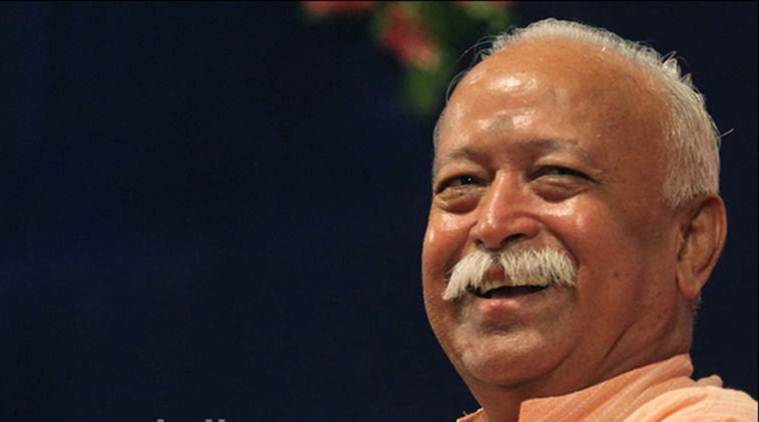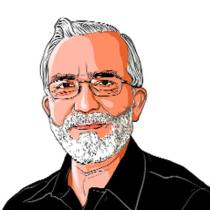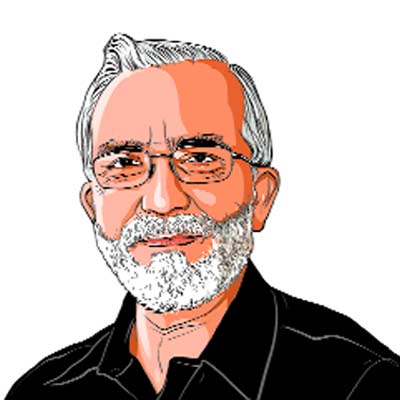Reshimbagh reality check
There is no glasnost. The same consistently confusing politics manifests itself as the core project of RSS.

Bhagwat concluded his Vijayadashami speech by yet again emphasising the oneness of being Indian and being Hindu.
In the speeches given by the RSS chief last month at Delhi’s Vigyan Bhavan, he had claimed that the RSS volunteers are free to join any party and he did not know why so many of them join only the BJP. Mohan Bhagwat could have waited for his Vijayadashami speech to seek an answer to that puzzle. His Vijayadashami speech addressed three crucial political controversies of the current moment — “urban Maoism”, Sabarimala temple entry and Ram temple. On all three, his message must have been music to the ears of the BJP.
He demonised “urban Maoists”, even caricatured them; on Sabarimala he expressed anguish that “repeated and brazen onslaughts” happen to Hindu society alone and demanded a law to facilitate a Ram temple at Ayodhya at the “janmabhoomi”. With such a strong coincidence of views, ideas and aspirations, it would be a wonder if RSS volunteers did not simultaneously work for the BJP.
Bhagwat concluded his Vijayadashami speech by yet again emphasising the oneness of being Indian and being Hindu. This is also the argument he made at length in the second speech he gave in September. Listening to that speech and now listening to his Dussehra speech, one wonders why the September speeches were exaggerated both by insiders and observers outside the RSS, as something of a departure and even glasnost.
The current RSS chief is different from his predecessors in three respects. One, he is more self-consciously attempting to reach out to outsiders. This is more a sign of organisational confidence gained by the RSS in the past two decades or so. It knows that some of its sanitised tenets have a broader acceptance now more than ever before and therefore, it has to keep intellectually intervening in the public arena unlike in the past. Two, Bhagwat is adept at packaging political controversies in the course of seemingly ordinary and acceptable messages. This art ensures that the eager follower gets the message right and, at the same time, confuses the gullible effectively. His September speeches got headlines not because he repeated the core ideas of the RSS but because he spoke about “diversity”. His discourse on diversity was a classic instance of appropriating existing intellectual trends and giving them a different meaning. Three, in practically disowning Golwalkar, Bhagwat certainly appeared bold. But there too, he gave an out to RSS swayamsevaks. He made a distinction between the contextual and the eternal and argued that the contextual is obviously context specific — so Guruji was not wrong, what Guruji said had a context. This line of argument gave Bhagwat headlines as a reformer and, at the same time, allowed him to console the core constituency.
How, then, does one place Mohan Bhagwat? His Vijayadashami speech as much as his September speeches amply make it clear that he is by far the most politically astute and politically driven RSS chief. In this, he is following in the footsteps of Balasaheb Deoras. Bhagwat’s politics is manifold. He clearly wants to keep channels of communication open with the Congress. He is also quite aware of the dangers of megalomania undoing the BJP and hence not afraid to implicitly criticise the government. At the same time, for the RSS, a strong BJP government is a precondition to expanding its agenda of uniting all Hindus. Thus, in the Dussehra speech, he went out of his way to say that non-voting is not a good option.
But Bhagwat’s politics is not confined to merely asking RSS cadres to vote; it is more about reasserting the Savarkarite ideas in a slightly modified form. He gives a circularly argued, confusing and yet crystal clear message about what Hindutva means. In the Vijayadashami speech, where the major part is about generalities such as security and self-reliance in military preparedness etc, the powerful message is about “we”, Hindus. The key words are “swa”, the nation and Hindu identity. This same theme is more elaborately explicated in the second speech in September.
Ironically, the RSS chief has managed to introduce confusion among observers and critics by his skilful appropriation of the vocabulary of diversity. A careful reading of his second speech, however, shows that he is constantly referring to sects that emerged from “our” tradition (sabhi bharat se nikale sampradayon ka jo samuhik mulyabodh hai uska nam Hindutva hai — Hindutva is the name of the collective normative essence of sects that emerged in India). So, while mentioning that the term Hindu is of a much later origin, he equates that term with Indic, Bharat and Arya. As such, the diversity he speaks about has more to do with the multiple traditions and sectarian practices within the broader “Hindu” fold. The objective is to underscore the unity of these traditions and practices and bring them together under the common conceptual rubric of Hindu thereby ensuring a pan-Hindu identity that transcends the diverse practices.
This larger politics is the politics of Hindutva. This politics seeks to address two challenges. On the one hand, it insists on unity of sects born “here”. As Bhagwat said in his Q&A at Vigyan Bhavan, everyone (including the Adivasis) is Hindu; some know this and claim this with pride, some know this but do not take pride in the fact, some know but hesitate to admit and some don’t know. So, here is the politics of constructing Hindutva that encompasses all “Indian” faiths and transforms those faiths into a more homogenised Hindu order and also converts faith into a powerful political lever called identity.
On the other hand, this politics seeks to give the impression that Hindutva is not so much about religion (faith, rituals and manner of worshipping), than about the nation. That is why “those who hesitate to admit being Hindu” need to be persuaded to adopt the non-faith based Hindu national identity. But this has a caveat. Even if one does not follow any of the faiths born “here”, everyone has to accept that the cow is sacred. While facilely agreeing that lynch mobs of gau rakshaks must be punished, Bhagwat asserted at Vigyan Bhavan that the cow is in any case a subject of traditional belief (parantu gai paramparagat shraddha ka vishay to hai hi). Evidently, Bhagwat is unable to de-couple his Hindu-Indian nationalism from Hindu religious sentiment. That is why his latest speech concludes with an unequivocal demand that the disputed site at Ayodhya be assigned for “constructing a magnificent Ram temple at the birth place of Shri Ram who is the personification of the life energy of the nation”.
From Vigyan Bhavan to Reshimbagh, the same, consistently confusing politics manifests itself as the core project of the RSS. Bhagwat will probably be recognised as one of its more articulate and audacious spokespersons. The articulation consists of his valiant effort to argue that Hindutva is not about religion and his audacity pertains to the claim that Hindutva is about religious beliefs and traditions.
So, the RSS is changing and the RSS has not changed.
The writer taught political science and is based at Pune
For all the latest Opinion News, download Indian Express App
More From Suhas Palshikar
- The urban Naxal subterfugeSuch naming is meant to suppress dissent. It erases the distinction between disagreement and violence...
- The new reservationIt is not a demand for social justice but proportional power-sharing that underlies the new quota agitations..
- Don’t hold your noseCongress needs to frame a cogent stand on coalitions rather than looking at them merely as tactical necessity ..








































No hay comentarios:
Publicar un comentario